Source: www.akhbar-rooz.com
By Soheila Vahdati
Translation by Iran Press Watch
The First Day
The Period of Bahá’í Killings began during the Islamic Revolution, when, on August 14, 1978, Ziaullah Haghighat was deliberately run down by motorcycle. He was targeted by a young zealot due to his Baha’i Faith. His death, three days later, from injuries exacerbated by deliberate medical neglect, was the first sacrifice of the Period of Bahá’í Killings. Afshin, his youngest son, remembers the events of that day.
Account of Afshin Haghighat
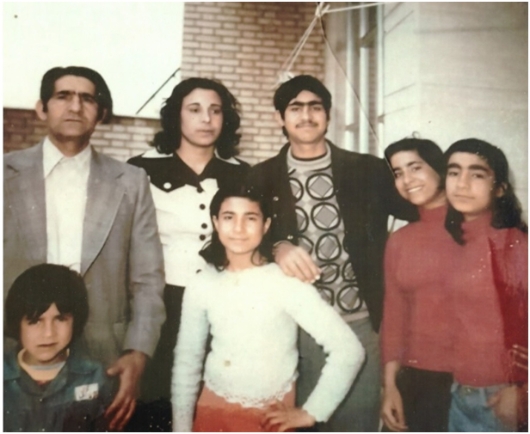
“It was summer. I was eight years old, a second-year elementary student. I went out of the house to play with my friends near the school. My school was in front of my father’s office. I had a strong attachment to my dad. Every day after school I went to his work and sat next to him. Friends and acquaintances all said that ’they are joined at the hip!’
“I left early to come home on that day. On the way back, I overheard neighbors in the alleyway that they said, ’they killed that Bahá’í finally!’
“I continued my walk home. At the corner of our alley, we had a small grocery shop. The shopkeeper as he stood in the frame of his shop’s door, in a dark tone, said to me, ’Did they kill your father?’
“I listened to them, astonished. But I could not understand what they meant. I came home and realized my mother is not home. My sisters told me that ‘Dad had an accident, a biker has hit him.’ They explained to me that they had taken him to the hospital, and that is why my mother was not home because she has gone to the hospital to see our father. I told what I heard in the alley to my sisters, and I said everyone in the alley said that ‘they have killed your father!’
“My sisters said, ‘No, that’s not the case. He had an accident.’
“Of course, later on, through our neighbors, we learned that the perpetrator had been waiting for my father on a motorcycle, with the intent to kill him. That morning my dad was returning to his office from the dairy shop across the street, where he would routinely go every morning, voluntarily helping the proprietor and managing his books. They were waiting for him, and while he was crossing the road, they hit him with the motorcycle.
“My father was in charge of a private company distributing kerosene in the area, which was delivered by tankers. A year before my father’s death, the Community Imam (Imam-Jumaa) wrote a letter to my father’s company chairman, stating ‘He (Ziaullah Haghighat) as a Bahá’í is a parasite of society. You expel him from the company so we can force him out of town.’ Mr. Attar, the head of the company who was a Muslim and a well-known man in Jahrom, brought the letter to us and said that ‘this impious wrote this.’ Mr. Attar responded to the Imam that my father ‘is an honest man and has worked for me for 12 years without any problems, and I have entrusted everything to him. Please find an honest man like him so I can delegate him all the accounts and books so that later I can get rid of him.‘
“That day, after a few hours, my mother returned from the hospital. She was very distressed and said, ‘Doctors are not cooperating!’
“My mother said that she was told that Ziaullah should be transferred to Shiraz, but they did not provide us with an ambulance to take him to Shiraz. And the time passed. A few days later, relatives came to take us to go to Shiraz for the funeral.”
Account of Legha Mosalla Nezhad
Legha Mosalla Nezhad, the wife of Ziaullah, tells the story in this way. “I was at my house when my brother came in and said, ‘there has been an accident … Ziaullah … someone has hit him with a motorcycle and ran away. Nobody dared to give him water. We took him to the hospital.’ My brother had taken him to a hospital with the help of one of the neighbors. Then he came looking for me, and we went to the hospital together. When I arrived at the hospital, they still kept him in the hallway. He still could not speak at that time. I asked him, ‘What has happened?’ He said, ‘I did not realize what happened. All of the sudden, I was thrown off.’
Ziaullah was very uncomfortable. He was constantly repeating ‘I am burning! I am burning!’ This was probably due to his Internal bleeding. Then they took him to the exam room. They shut the door and did not let me in. I do not know if the nurses cooperated or not. Mr. Attar, the head of the company where Ziaullah worked, immediately followed us to the hospital. He told the hospital officials, ‘He’s like my son! Please do whatever you can for him.’
Dr. Hakhamaneshi, a non-active Bahá’í, worked in the same hospital. ‘Give them an ambulance to take him to Shiraz,’ he told the hospital officials.
The head of the Jahrom’s hospital was a doctor named A’lipanah. He was a very fanatic Muslim and a follower of Hossein Agha (the community Imam). He tried his best to finish the job right then and there to close the case. Their intention was not to give us an ambulance for my husband and to let him die there. He told Dr. Hakhamaneshi, ‘A dog is about to die, why are you stressed?’
But Dr. Hakhamaneshi tried hard to get the patient transfer order and told Dr. A’lipanah, ‘You and I are doctors, we have pledged not to have any prejudice. We have sworn to ignore everything and save the patients’ life.’
This discussion lasted from morning to noon. Finally, two hours later, Dr. Hakhamaneshi, after strenuous effort got an ambulance and called the Namazi Hospital in Shiraz to ‘prepare the operating room!’
My brother and I went to Shiraz with the ambulance. Ziaullah became unconscious on the way. The encounters were good at the Hospital in Shiraz. My sister worked there in the anesthetic room.
Ziaullah was taken to the operating room, but he never came out of the coma. He had a brain aneurysm. He was unconscious for three days, and then he passed on.
My husband was a great man. He was infamous for hospitality. He always loved to have guests. The Bahá’í meetings and gatherings were at our house at all times, and many would attend. The neighbors were so pleased with him that they were crying and saying, ‘May God debunk them for killing such a man!’ After a while, we returned from Shiraz. At that time, we went to the court. They would not give us a straight answer. No one would cooperate with us. We stayed in Jahrom for another two or three years. The neighbors were good and cooperated with us. Before the revolution, as we were plumbing our house for city water we did the neighbors’ homes too. After the revolution, they said, ‘No one has the right to disrespect the Haghighat family.’ A group wanted to burn our house down, but the neighbors prevented them. They said that if you burn their house our houses will catch fire as well and this way they prevented them from burning our house. Our neighbors were very good to us, and they were telling us, ‘The people who are doing these things are hoping to go to Paradise.’ The neighbors sympathized with us, but they said that Ziaullah had been deliberately killed , telling me ‘your husband was on the list’ and ‘finally they killed him.’
There were some who harassed us, but there were always other people who said these abuses against the Bahá’ís are not right. One day my son came home and told that the propane delivery had refused to fill our propane tank that day. They had said ‘you are Bábis, and we will not give you propane. Renounce your religion so we can fill your propane tank.’ I said, ‘You want me to leave my religion for a tank of propane? Don’t give me any; I’ll burn firewood!’
In short, after the fire incident of Saadi 2 occurred in Shiraz, they came from the Bahá’í Assembly and told us to sell the house and move to Shiraz. Mr. Afnan 3, God bless his soul, said, ‘Come to Shiraz, so the girls would be safe, since there’s no one to watch after you, it’s a small town as well.’ Even the neighbors were worried about us. They said, ‘Why did you come back? Get out of here, they will kill you, or they will rape the girls!’ So we moved to Shiraz.
After the revolution, during which they imprisoned many just for being Bahá’ís in Shiraz, one of our good friends, Ehsan Mehdizadeh 4, was in the Adelabad prison of Shiraz with the former Police Chief of the city of Jahrom. The former Police chief told Ehsan Mehdizadeh that ‘Ziaullah Haghighat’s blood was spilled in vain. Tell his wife to go to Jahrom and ask for his dossier.’
So, I went from Shiraz to Jahrom. The head of the court of Jahrom asked me: ‘Lady, your husband was a Bahá’í, and no one cooperates with us to get the killer. We brought many people here saying that your husband was a great man and he could not even hurt a fly. But everyone said that they could not say anything, and if they do, the life of their children is in danger. If we say anything, we will have the same fate as him.’
The Head of the court told me ‘now you cannot take any actions because they have announced all cases from the year 78-79 are closed, and you should go. Anytime the world is set aright, then come back and ask for justice for your husband!’
Dr. Hakhamaneshi said that ‘I have been searching and the Hajj Bashi’s sons have done this by order of Hossein Agha.’ Dr. Hakhamaneshi strongly insisted on finding the killer. We said that nothing could be done unless through the legal authorities. Of course, we did not have the means either. The kids were small, and there was no one to follow up the case. At that time people said that they had asked the killer to flee town, but after a while when I returned to Jahrom, I heard that he had gone to the front line and was killed in the Iraq war.”
Account of Afshin Haghighat – continued
“The town was small, and the identity of the person who hit my dad was known. But nobody dared to give his name. They even said in court that if they talk, they’d be killed. Now that many years have passed those old neighbors come and tell us that my father’s murder was calculated and planned, but they still do not dare to say who had done it. They made the killer flee, and they all talked to each other that nobody should say anything and did not even talk about the accident anymore. It was during the revolution, and people out of fear abetted the killers. The neighbors, although sympathetic, told us that they could not put their children at risk by naming the murderer.
This did not just happen to my dad. They also killed a large number of young people of Jahrom who were not Bahá’ís, but sympathizers of political groups. Apparently, at the directive of the Community Imam, the young people were taken at night from their homes or off the street, killed and thrown into aqueducts around the city. They slaughtered 16 or 17 people and a detailed case was created, to no avail.”
The Killing Organizers
Identifying the organizers and the perpetrators of the murder of Ziaullah Haghighat’s is not such a difficult task. According to survivors who spoke about the crimes of Jahrom, 5 at least three were involved in the crimes of Jahrom: Hossein Ayatollahi, Ali Mohammad Besharati, and Nasrollah Maimana.
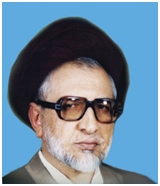
1- Ayatollah Seyyed Hossein Ayatollahi
Hossein Aqa, who Legha Mosalla Nezhad (wife of Ziaullah Haghighat) refers to as Ayatollah Hossein Ayatollahi, also known as Hajj Hossein Agha, was the Community Imam (Prayer Imam or Imam-e Jumaa) of Jahrom. “Ayatollah Seyyed Hossein Ayatollahi, by order of his father took the responsibility of Community Imam of Jahrom and started propagating the rich culture of Islam in 1961. After the victory of the Islamic Revolution under the command of Imam Khomeini (PBUH) had the responsibility as the Jahrom’s Community Imam through his living years.” 6
He “was arrested in 1963 for the activities against the Pahlavi regime, and then released and returned to Jahrom”. Now his name is displayed in the Evin Prison Museum.
He has been mentioned on the website of “followers of the Governance of the Jurist of Jahrom” among the “Celebrities of Jahrom”: “Sayyed Hossein Ayatollahi was the Shiite Mujtahid (Clergy), Representative of Ayatollah Khomeini and leader of the Qanat group in Jahrom.” 1
On this website in his biography section noting his honors it is mentioned, “his great-grandfather Abdul Hossein Lari ordered the killing of the Mazdakites and the Bahá’ís of southern Fars province during the Qajar period, which resulted in their massacre.” 1
Interestingly, the website makes mention of the fact that the same ancestor was a constitutional advocate and neglected to say that he, as a “pro-Constitutional cleric after Muhammad Ali Shah Qajar shelled the parliament and arrested the liberators”, declared in a historic fatwa that he is opposed paying tax payments to current Shah.”7 However, their counter-Bahá’í and anti-dissident views have been highlighted, indicating a heavyweight of antagonism against Bahá’ís and dissidents among the activists of the website and the followers of the Governance of the Jurist in Jahrom. It is also said that this boy showed traits of that great grandfather because on this website the Qanat (aqueduct) Group has been introduced the same way. “After the victory of the 1979 revolution, he (Ayatollah Hossein Ayatollah) and Ali Muhammad Besharati organized a group to clean up the political and personal opponents. They threw the murdered bodies into the nearby aqueducts of Jahrom, or they threw individuals live into the aqueducts and then killing them with a grenade.” 1
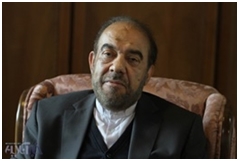
2- Ali Mohammad Besharati
Ali Mohammad Besharati was the Minister of Interior of Mr. Hashemi Rafsanjani and is now a member of the Expediency Council and now denies cooperation with the Qanat group in the past. 8
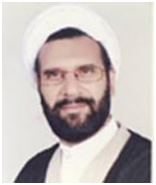
3- Nasrullah Maimana
Hojjat al-Islam Hajj Aqa Nasrullah Maymana, a student of Hossein Aqa, is now a professor in the field as well at the Islamic Azad University of Jahrom. 9
Perpetrators of Murder
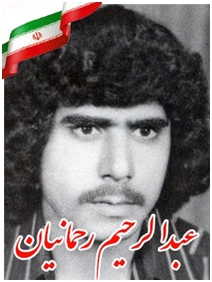
One of the survivors who closely observed the crimes of June 15th and Qanat in Jahrom, who also knows Hajj Bashi’s family well, called “Alef,” 5 says about Hajj Bashi Rahmanian, “It’s very dry and rigorous. Khomeini’s stubborn emperor. He believed that studying for girls was forbidden, and boys should not study more than the elementary school. He had five sons, three of them, Abdul Rahim, Mohammad and Mostafa on the front-line of the war. “He added that” Abdul Rahim had been studying until grade 8 or 9. He was a welder and had a motorcycle. Once, Abdul Rahim had beaten one of the supporters of the Mujahideen organization. When asked by a relative why his close friend was beaten so badly, Abdul Rahim replied, “What did you think! It was because of you that I did not kill him! ”
He adds, “If Ziaullah who was hit by a motorcycle and killer is Hajj Bashi’s son, then he is Abdul Rahim.” Abdul Rahim Rahmanian was killed at Allah Akbar’s Highlands (in Iraq) in May 1981 three years after killing Ziaullah Haghighat. 10
“Alef” added that “one of the members of the Qanat group, Karim Yaqoubi, quit the group after a while and one month later he was deliberately killed. Karim Yaqubi, before his death, described to one of his close friends, my intimate friend, how they would prepare people for killing. For example, Nasrallah Maimana, in a dark room with lit candles in its corners, would go in the dark behind the platform and speak to them that you had sinned in the time of the king, and for God to forgive you, you should kill a communist or a counter-revolutionary. ”
Were the Neighbors Right?
It seems that the family’s neighbors were being truthful, that this brutal atrocity was committed by a young man who believed the act would allow him to go to Paradise. This cruelty, which is now looking more like a horrific misunderstanding, may never happened had Hajj Bashi not kept his sons in ignorance by forbidding them to become educated.
The atrocity of the murder of Ziaullah Haghighat, and so many others, may never have happened if the value of human life had not been diminished for advancing revolutionary aspirations. How many of these brutal crimes, we might ask ourselves, would never have happened had the Iranian people not been deliberately kept in ignorance and fed hateful propaganda against their neighbors and promises of paradise in return for acts of violence against those not valued by the revolution?
_____
- The website of followers of the Governance of the Jurist of Jahrom, accessed 30 August 2017. p-velayat.rozblog.com
- The flow of incidents related to the fire in Sa’adi neighborhood in Shiraz which is under preparation.
- Ehsan Mehdizadeh was executed because of being a Bahá’í in Shiraz in 1981.
- Abolqasim Afnan was a well-known Bahá’í in Shiraz and a trustee of the house of The Bab in Shiraz.
- Interview with three witnesses of the Qanat crimes, Monireh Baradaran, Bidaran Web site, accessed on August 30, 2017. www.bidaran.net
- Commemoration of Ayatollah Seyyed Hossein Ayatollahi + Film, Seda Va Sima News Agency. Accessed on August 31, 2017. www.iribnews.ir
- Akhund Khorasani, Website of Rasekhoon, Accessed on August 28, 2017. rasekhoon.ne
- Besharati: I wanted to interrogate Ayatollah Taleghani, but he did not accept us / Ahmadinejad was an exemplary governor, Khabar online website, accessed 20 August 2017. www.khabaronline.ir
- Website of the cultural center of Jahrom’s solaleye Pakan (Progeny of the Pures). solaleyepakan.blogfa.com
- Website of the Headquarters of the Congress of Commanders and Fifteen Thousand Martyrs of Fars Province and the Center for the Protection of the Works and Publishing of the Values of the Holy Guard Corps and the Basij of Fars Province. www.15000shahid.ir
Leave a Reply